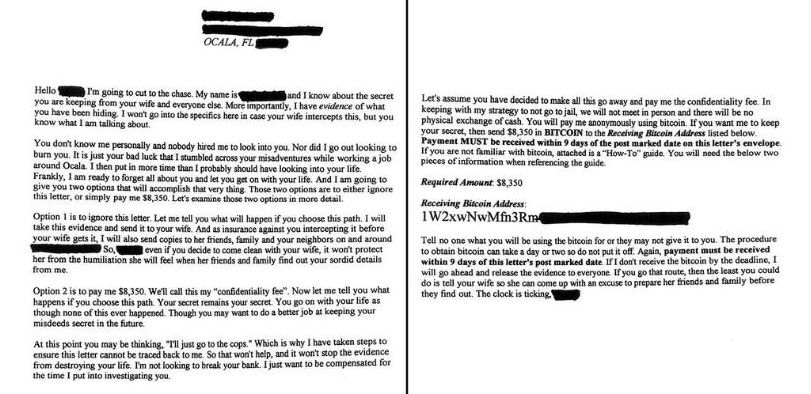
Adultery blackmail scam targeting Florida residents

The FBI in Jacksonville is warning residents of central Florida and beyond of an emerging scam that is targeting a variety of individuals. FBI Ocala has received numerous reports of the “blackmail scam” in recent weeks. The scam usually begins when a scammer sends an anonymous letter claiming to have uncovered evidence that the recipient of the letter has committed acts of adultery.
The scammer threatens to reveal the information to the recipient’s spouse, family and friends, and demands payment in exchange for secrecy. The scammer says that he knows his victim is involved in an adulterous affair – and that he has proof.
In an effort to avoid detection, the scammer often insists on being paid in bitcoin, a virtual currency that is legitimate but difficult to track.
The blackmail scam is not new. It comes in many forms and will continue to evolve as scammers change their tactics to remain successful. It is also unknown how widespread this version of the blackmail scam is currently. However, a similarly worded letter has been reported to law enforcement agencies across the country.

In this instance, the scammer is playing the law of averages. If someone receiving the blackmail letter is not involved in an adulterous affair, that individual would feel safe in just ignoring the letter. However, if the recipient of that blackmail letter is having an extra-marital affair – they might be conned into paying up to $8,000 to keep that affair a secret.
The FBI advises victims of the blackmail scam, or any other fraud, to contact their financial institutions and file a report with law enforcement. Victims should also submit the information to the FBI’s Internet Crimes Complaint Center at www.ic3.gov.
Additional information regarding common fraud schemes is available here.
Source: FBI Jacksonville
~ Posted by: Richard Webster, Ace News Today / Connect with Richard on Facebook and Twitter






